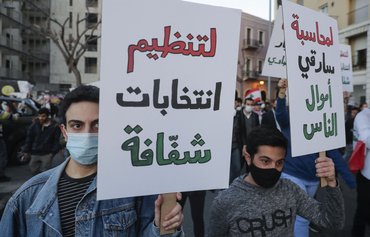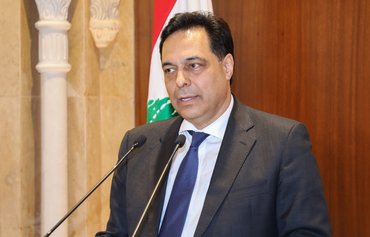A few weeks before the deadly August 4th blast ripped through Beirut's port and devastated much of the city, exposing the government's failures for all to see, a group of activists launched a new platform to push for better governance.
Now that the government has resigned, in the wake of the disaster, the movement remains determined to see that its demands are met, movement co-founder Rashad Rafeh told Al-Mashareq.
Around 70 activists gathered July 15th to launch the National Civil Front, a political framework that seeks to unify the efforts of Lebanese citizens who have been participating in the mass protests that kicked off last October.
A founding document that outlines the movement's political principles and objectives includes ensuring Lebanese sovereignty and that "war and peace decisions" remain the sole purview of the government.
The government has not been able to put the country back on track amid the challenges it is facing, the document states, because "it is a prisoner of forces that thrive on the quotas applied to the political and economic systems".
Therefore the National Civil Front seeks to achieve the people's demands for "the formation of an independent government", according to the document.
It aims create an environment conducive to free, fair and democratic parliamentary elections; build an independent judiciary to prosecute corruption; recover stolen funds; and restore confidence in Lebanon.
It seeks to implement the reforms that were set as a condition for international aid, and ensure the country's return to the Arab and international fold.
And it seeks to ensure Lebanon will distance itself from regional conflicts per the Baabda Declaration; form a foreign policy based on national interest; and build a productive and sustainable national economy in the service of the people.
Roadmap to recovery
Following the government's resignation, the movement must continue to "press for the formation of an independent government", Rafeh said.
"The starting point for reforms begins with the establishment of an independent government with exceptional powers that is capable of achieving reform," he noted.
The first section of the National Civil Front's founding document outlines the movement's objectives: "to emphasize sovereignty, a productive economy, social protection and the civil nature of the state", he said.
The second addresses reforms required in order for the state to recover.
The new platform will help to show that those who are demanding reforms "have a clear vision of politics, the economy, society and the structure of the state, and are capable of producing solutions", Rafeh said.
He stressed the need to continue to exert "pressure in the street to this end, especially as there are attempts to recreate the current power structure through formation of a so-called national unity government".
Independent government
Demonstrators have been raising the issue of Lebanese sovereignty and calling for arms to be be restricted to the state for some time, said Joey Lahoud, a lawyer who has been active in the demonstrations.
"How can an independent government be established in the presence of illegal weapons?" he told Al-Mashareq, in reference to Hizbullah's armament.
"Since the start of the protest movement, we have called for an independent government," he said, adding that it has now become clear that Hizbullah dictates the government's positions on every issue.
The party wields influence on the government in regards to "the economy, the attitude toward banks, dealing with the judiciary, and even foreign policy", Lahoud added.
"There can be no solution to all the dilemmas that exist in Lebanon without first tackling the issue of illegal weapons and the internal imbalance that resulted from the existence of an armed group that derives strength from foreign powers," he said, referring to Hizbullah's backer, Iran.

![Protesters take part in an October 23rd demonstration in Beirut to denounce deteriorating economic and living conditions in Lebanon. [Junaid Salman/Al-Mashareq]](/cnmi_am/images/2020/08/25/25229-Lebanon-Beirut-protest-600_384.jpg)






